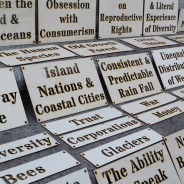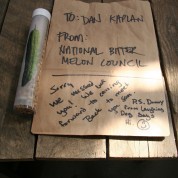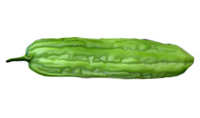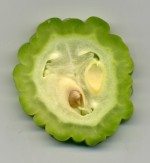Composing the Future: Extinction/Loss
Participatory performance as part of Boston Coastline: Future/Past with Catherine D’Ignazio. Part of the DeCordova Sculpture Park and Museum’s exhibition Walking Sculpture: 1967-2015. Performed on June 16, 2015 This project invited participants who attended the performance walk Boston Coastline: Future/Past to create a collaborative sidewalk-stenciled timeline of the future vis a vis extinction and loss. Since 2011, through an ongoing series of dialogue-based...
Read MorePut Your Bitterness By
A National Bitter Melon Council Performance and Public Intervention, 2011 International Pickling Day Festival, Lower East Side, New York, NY Put your Bitterness By was a site-specific intervention at the International Pickling Day Festival of the Food Museum in New York, NY. The National Bitter Melon Council joined pickling enthusiasts from NYC and beyond to celebrate all things preserved, fermented, and put by. The festival was filled with vendors of fermented pickles,...
Read MoreCommunity Supported Agriculture: A Share of Bitter Melon
A National Bitter Melon Council Public Intervention project, 2006 Various kitchens and tongues in Eastern Massachusetts, USA via Farmer Collaborators The food distribution ideology of the National Bitter Melon Council’s Community Supported Agriculture (CSA) operates using strategies and producing results that parallel Mail Art, a conceptual art practice that emerged in the 1960’s where visual art, sound, poetry, and other whimsical objects were distributed at random...
Read MoreBitter Mellon Homeopathy for Urban Renewal: Bitter is Better
A National Bitter Melon Council Public Intervention Project, 2006 Various sites in the Boston Metro Area: Chinatown, Somerville, Cambridge, Roxbury, and Jamaica Plain Bitter Melon Homeopathy for Urban Renewal: Bitter is Better was a public intervention project that invited interested growers to cultivate Bitter Melon plants in neglected urban spaces. The project was inspired by homeopathic healing philosophy where illness is treated with low-level doses of the toxifying agent. The...
Read More






 Berwick Research Institute
Berwick Research Institute National Bitter Melon Council (NBMC)
National Bitter Melon Council (NBMC)